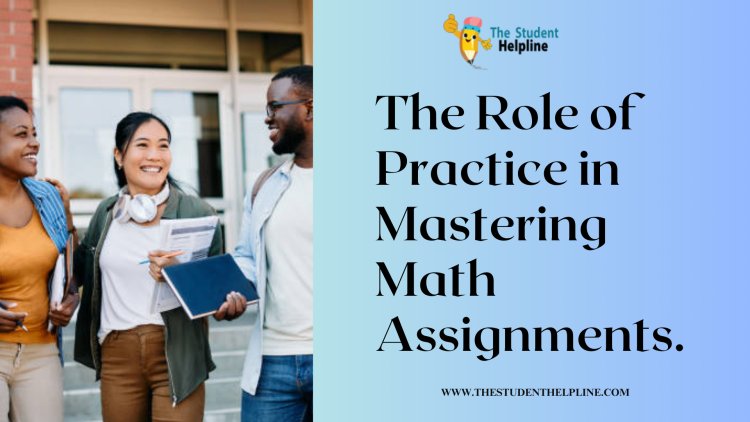Mathematics is a subject that requires a deep understanding of concepts, the ability to apply these concepts in various contexts, and a significant amount of practice to achieve mastery. Whether you are a student struggling with basic arithmetic or an advanced learner tackling complex calculus problems, practice remains a fundamental component of success. In this context, the role of practice in mastering math assignments cannot be overstated.
Building a Strong Foundation
At the core of mastering mathematics assignments is the need to build a strong foundational knowledge. Mathematics is a cumulative subject, meaning that each new concept builds upon previously learned material. For instance, understanding algebraic equations is essential before delving into more advanced topics like calculus. Practice helps reinforce these foundational concepts, ensuring that students have a solid base to tackle more complex problems.
When students engage in regular practice, they become more familiar with the structure and logic of mathematical problems. This familiarity breeds confidence and reduces anxiety, which are common barriers to learning. By repeatedly working through problems, students can identify patterns, understand the underlying principles, and apply these principles to new and varied scenarios. This process is crucial for developing a deep and lasting understanding of mathematical concepts.
Enhancing Problem-Solving Skills
One of the primary goals of mathematics education is to develop strong problem-solving skills. Math assignments often require students to apply their knowledge in novel ways, which can be challenging. Practice is essential in this regard because it allows students to experiment with different strategies and approaches to problem-solving. Through repeated exposure to a variety of problems, students learn to recognize different types of problems and the most effective methods to solve them.
For example, a student might initially struggle with word problems involving rates and proportions. Through consistent practice, they can learn to identify key information, set up equations, and solve for the unknowns. This process not only improves their ability to solve similar problems but also enhances their overall problem-solving skills, which are valuable in many areas of life beyond mathematics.
Identifying and Overcoming Weaknesses
Regular practice also helps students identify their weaknesses and areas for improvement. By working through numerous problems, students can pinpoint specific concepts or types of problems that they find challenging. This self-awareness is crucial for targeted learning and improvement.
For instance, a student might notice that they consistently struggle with geometry proofs. By focusing their practice on this area, they can work through their difficulties and gradually improve their understanding and performance. This targeted approach is much more effective than a general review of all topics, as it allows students to allocate their time and effort where it is most needed.
The Role of Mathematics Assignment Help and Assignment Helpersassignment helper
While practice is essential, it is also important to recognize that students may need additional support to fully master their
mathematics assignment help. This is where mathematics assignment help and assignment helpers come into play. These resources can provide valuable guidance and support, helping students navigate challenging problems and reinforcing their understanding of key concepts.
Mathematics assignment helpers can offer personalized assistance, tailoring their approach to the specific needs and learning styles of individual students. They can provide explanations, examples, and additional practice problems to help students grasp difficult concepts. Moreover, assignment helpers can offer strategies for effective problem-solving and study habits, which can enhance the overall learning experience.
For example, an assignment helper might work with a student to develop a step-by-step approach to solving algebraic equations. They can explain each step in detail, provide practice problems, and offer feedback on the student's work. This personalized support can make a significant difference in a student's ability to master their math assignments.
Developing Time Management and Study Skills
Effective practice also involves developing strong time management and study skills. Mathematics assignments often require a significant amount of time and effort, and students need to learn how to allocate their time efficiently. Regular practice helps students develop a sense of how long different types of problems take to solve, allowing them to plan their study sessions more effectively.
Moreover, consistent practice encourages students to develop good study habits, such as setting aside dedicated time for math practice, breaking down complex problems into manageable steps, and reviewing their work regularly. These habits are not only beneficial for mastering math assignments but also for academic success in general.
Building Confidence and Reducing Anxiety
Mathematics can be an intimidating subject for many students, leading to anxiety and a lack of confidence. Regular practice helps build confidence by allowing students to see their progress and improvement over time. As they successfully solve more problems and understand more concepts, their confidence grows, making them more willing to tackle challenging assignments.
Assignment helpers can play a crucial role in this process by providing encouragement and positive reinforcement. They can help students set realistic goals, celebrate their achievements, and maintain a positive attitude towards learning. This support can be particularly valuable for students who struggle with math anxiety, as it helps them overcome their fears and develop a more positive relationship with the subject.
Conclusion
In conclusion, practice is a vital component of mastering math assignments. It helps build a strong foundation, enhances problem-solving skills, identifies and overcomes weaknesses, and develops essential time management and study skills. While practice is crucial, the support of mathematics assignment help and
assignment helper can significantly enhance the learning process. By providing personalized guidance, encouragement, and additional resources, these helpers can help students achieve their full potential in mathematics. Ultimately, the combination of consistent practice and targeted support is the key to mastering math assignments and developing a deep and lasting understanding of mathematical concepts.

















